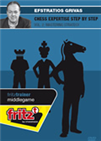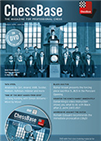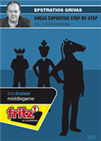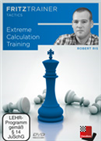A hard working chess player and trainer
Many chess amateurs dream of becoming titled players, attached the coveted prefix FIDE Master, International Master, or Grandmaster to our names. Unfortunately few are ready to actually put the time, energy, and financial resources needed for such endeavour to actually be successful. The result is the use of the magical word "talent" to describe and explain the other players who actually achieved such titles. Instead, here we can read of a young man who learned the game quite late in life by today's standards — 13 years old — and who became IM in 5 years, and GM in 13 years. Obviously to describe such a huge feat, accomplished by what in the past would have been called a "hero", a whole book would be needed. But in a world running on messages of 170 characters, we opted to share his wisdom and knowledge with us through this interview. Efstratios Grivas is a well-known name in the chess world. He has a huge number of books and also ChessBase DVDs to his credit. His passion for chess is clearly like a fire, wildly burning.
 As James Whitaker has mentioned, ‘The person who knows ‘how’ will always have a job. The person who knows ‘why’ will always be the boss’.
As James Whitaker has mentioned, ‘The person who knows ‘how’ will always have a job. The person who knows ‘why’ will always be the boss’.
This is the type of person we want to associate with in our chess journey. Someone whose passion can inspire and lead us to the next level, because he walked the same path we are walking today. Clearly a great chess player everyone of us wants to follow, and learn from. He is a famous chess trainer and, in fact, before going to the interview, I'd like to present a couple of games of one of his "successes" as trainer. We can also know the value of a trainer from his pupils and GM Hristodoulos Banikas (pictured) who had a peak rating of 2646, is a good example.
In these games we can admire a draw against Kasparov, who was definitely saved by the bell, and also a game won against one of the strongest engines.
GM Grivas is a well of profound chess knowledge, with gems one can find in his books. In one he described the errors of training he made in youth and what the correct training program should be, and ended with a phrase I find utterly true: "My over the board knowledge was good enough to overcome these 'slight' problems as everybody seems to be obsessed by rating and not care for the actual training strength!"
And here we discover a chess secret, known only to a cabal of FIDE trainers: playing "Fortnite", or "Call of Duty Black Ops", 12 hours a day will not make someone GM material. Please don't reveal this secret, since I just discovered it myself!
Davide Nastasio: Could you tell for our readers how the chess journey began for you?
Efstratios Grivas: Well, as like the vast majority of the chess players, I noticed a chess club in my neighbourhood and entered it, when I was a little older than 13 years old. I loved the environment and the game and began playing daily; nothing new under the sun! I have a funny story from my early years: a month or so after learning the rules of the game, I participated at my first official tournament, in which I lost all 13 games I played. And I lost them in a very bad way and everybody laughed at how badly I played. I was even voted the ‘friendliest’ opponent - everybody was glad to face me over the board! Many years later, a friend of mine who was Vice-President of my club at the time (the tournament took place at the Kallithea Chess Club) told me the following story: A well-known Greek coach was passing by the club and was asked his opinion about a possible talented player among the 14 children that participated. The coach took a look at the tournament score board and said: I do not know who may become a good chess player, but I know who will never become anything - and showed my name - the player who finished with 0/13… In the end the coach proved to be in some way accurate, since he had actually discovered the only player in the tournament who managed to become a Grandmaster! Moral to learn: do not give-up!
DN: Who coached you when you were young?
EG: My first coach was Panayiotis Drepaniotis and then IM Dr. Nikolai Minev (1981-1982), FM Michalis Kaloskambis (1984-1986), GM Efim Geller (1987-1988) and IM Nikolai Andrianov (1990-1996). I will never forget my coaching times with the legendary coach Dr. Nikolay Minev, who died on 2017.

Minev on the left, with some of his books
For those who don't know Minev, he was a very prolific chess author, and his book on rook endgames has been used by many generations of grandmasters to reach GM level strength in those endgames which appear in nearly all the games. In order to remember such great player and teacher, I decided to find few games to share.
DN: Which book(s) influenced you most in your formative years?
EG: I didn’t have any particular preferences; I was just reading everything I could get! Of course my generation grew-up with the Chess Informator series, and I was always like to read the New In Chess magazines. I do not think in general that there are good or bad books; simply there are books you like and you understand and books that you do not like and you do not understand. But there are always valuable points in any book.

For those who love chess books, GM Grivas has authored two interesting ones: The Tactics Bible, and Bishop Endings.
One can learn a lot from The Tactics Bible, and can be used by coaches or chess teachers to create chess lessons. Here an example. The following position comes from page 133, game 79 Joshua Waitzkin vs Edward Frumkin NY 1987, one can play it against an engine directly from the diagram:
And here the game for those who just want to see how it ended:
DN: How did you become a Grandmaster?
EG: Well, by quality training and playing a lot in strong tournaments; how else? I became GM in 1992, but at that time it was far more difficult than today, as rated players weren’t as high as in our times. At this period the rating barrier of 2650 made you already a top-10 player, so getting 2600 performances (GM-norm) was a difficult task. I feel that the GM-title has devalued considerably.
It's interesting how Grivas mentioned "Quality training" because this is exactly the same idea the new ChessBase Magazine 188 is based upon! It has become an amazing training tool, more than just news or annotated games from the latest tournaments.
 Tata Steel 2019 with analyses by Anish Giri, Vishy Anand, Vidit, Peter Svidler etc. Yannick Pelletier, Erwin l'Ami and Mihail Marin present selected games in video format. Plus 11 opening articles with new repertoire ideas, e.g. Dutch with 2.Bg5!?
Tata Steel 2019 with analyses by Anish Giri, Vishy Anand, Vidit, Peter Svidler etc. Yannick Pelletier, Erwin l'Ami and Mihail Marin present selected games in video format. Plus 11 opening articles with new repertoire ideas, e.g. Dutch with 2.Bg5!?DN: Keres and many other GMs do describe their chess life like a via crucis, there are some pleasant experiences, but also a lot of pain, especially when one loses important tournaments or games, what about you?
EG: Joy and pain are main parts of our life; not only of chess. I would consider them a natural outcome; a change of emotions that exist everywhere. You have to learn to live with them; avoid as much pain as you can and try to get as much joy as it is possible.
DN: Is professional chess a good career option for the young today?
EG: Well, if you can get to 2700+, you can make a decent living; otherwise simply forget it. Prizes have decreased considerably, conditions have devaluated and in general there is not enough room for everybody. I think that you can make a fairly decent living as well by coaching, authoring, etc. But you cannot expect to make a fortune, except if you can get to 2800+, but this is also questionable. And there is always the question as well, of how to survive when you get older and you can’t perform as previously… It’s a profession with its pluses and minuses, like nearly any other; everybody has to evaluate them and make his own choice. In every period of your life you do things which suits you. When I was a professional player I enjoyed it very much and I didn’t think of a coach’s career. Although I wrote my first book when I was 18 years old and I started training the youth national Greek team when I was 19 years old. I cannot consider it as training as I didn’t really know how to train at that time. I was just stronger than the others, and I was asked to help the members of the team.
When I was a professional player I could make a good living by playing but suddenly the prizes became so small that it made it undeserved to play professionally. When recently I saw the winners of the 2018 European rapid and blitz championships holding the cards with the amount of their prizes, I could not believe it. Was it pocket money? At the times when I played it would be a starting fee. I had some good results in my chess career and maybe to some people it doesn’t sound great but for me it is something that not so many can do.
As a coach you can have more stable life. The most important period for me was when I worked in Turkey creating the program which resulted in the 6th position of the Turkish team in the World Chess Olympiad 2016. These guys were kids when we started working together, and they were already Grandmasters when I left them. It was great what they achieved by today, if you consider the situation with Turkish chess in 2005.
 Rook handling and generally speaking endings constitute one of the most fascinating elements in chess. Rich in both tactical and strategic possibilities, they offer us the opportunity to marvel at its endless creative potential and unique ideas. Of all chess endings (pawn, queen, rook, bishop and knight), rook endings are the ones encountered most frequently.
Rook handling and generally speaking endings constitute one of the most fascinating elements in chess. Rich in both tactical and strategic possibilities, they offer us the opportunity to marvel at its endless creative potential and unique ideas. Of all chess endings (pawn, queen, rook, bishop and knight), rook endings are the ones encountered most frequently.DN: Lately there has been a great talk of Chess960 as the future of chess, what is your opinion about it? Did you play it?
EG: No future at all; it is already dead. The future of chess, we like or not, lays on faster time controls, make it applicable for TV broadcastings, minimising cheating, increasing ‘surprising’ results, etc. Yes, the quality will decrease, but we have to live with our times, where everything is faster and chess can’t fall behind.

DN: Can you play Blindfold games, and what is your opinion of blindfold play?
EG: Any GM or IM can of course play, so the answer is yes; the question is on how many boards which is unknown to me, as I never tried too many. It is mostly an exhibition and training tool and can create some positive advertisement for our game as well.
DN: How far do you trust the computer evaluation of a position?
EG: I accept engines’ evaluations as an assisting (and confirming) tool in my analysis. Lower rated players tend to fully trust the engines’ evaluations, as they do not have the strength to evaluate themselves and this is understandable.
DN: If one side is attacking and the other side defending, who needs to calculate more?
Why?
EG: No question — both! If the position is balanced, then the one who does it better, wins the game!
DN: Is it better to rely on one’s own intuition and judgment rather than calculate endlessly and get into time trouble?
 Special attention will be paid to Intermediate Moves, Quiet Moves, Sacrifices on Empty Squares, Mating Patterns, Ignoring Opponents Threat, Calculation in Defence and Method of Comparison. Plus 50 interactive examples to test your knowledge.
Special attention will be paid to Intermediate Moves, Quiet Moves, Sacrifices on Empty Squares, Mating Patterns, Ignoring Opponents Threat, Calculation in Defence and Method of Comparison. Plus 50 interactive examples to test your knowledge.EG: Intuition and judgment are the products of constructed quality education. Calculation is in high need, but your education helps you to understand what you have to calculate. There are of course positions where only calculation counts (as for example opposite-castling positions) and this might create time trouble. Every game is different.
DN: What is your advice for a promising young player (2200-2300 Elo category)?
EG: Get a qualified coach and follow him! Study and play a lot. We could write numerous pages on chess training but I will stick on a few remarks: First of all I do not believe in the ‘talent’ form. As I am used to saying and writing, ‘Talent is the excuse of the failed’. If you want to improve you need to work hard under the expert guide of a qualified trainer/coach. The problem is that there are thousands of trainers/coaches, but very few of them are really qualified and that's an eternal problem. The coach who wants to improve should behave ‘properly’. He should work daily, discover new things, and never think he has learnt enough. If we expect from our students to get better we have to get better too. This is what separates the coach who is devoted to this profession from the one who makes this job formally.

GM Grivas with one of his latest books, surrounded by his wonderful chess library, and trophies
DN: Do you have any advice for senior players in the 2000 range?
EG: Primary you have to enjoy the game. Age and potential health problems are not of a help to become better. But still, if you can devote time with a qualified coach, things might happen.
DN: Now I'd like to ask you some questions about your books, because I know you are a prolific author. How did you select material for your own books?
EG: First the idea is created. Then I try to describe the skeleton of the book and I am searching for relative examples in ChessBase, books and the internet, which is extremely helpful today. Sometimes I am asking help via Facebook.
Before ending the interview, I'd like to show the other book from Grivas which I thought was worth studying. Like Grivas mentioned, there are no secrets for improving in chess, hard work seals the deal. So it is useful to read a book from a great trainer like Grivas, especially regarding what Capablanca thought it was fundamental for each player to improve: the endgame! In his book "Bishop endings — an innovative course" one can acquire some very important ideas, which will become useful in one's own tournament games.
On page 11 from Grivas' book we find a study from 1892 that teaches us the weakness of the bishop, as always one can play it directly against the engine from the diagram, or scroll down and see the solution:
Here is the solution:
The following position, coming from a real game played in 2014, shows the power of the bishop. Would anyone believe a bishop can draw against three united pawns? Try it against the engine:
Here is the final part of the game:
However, the point on having the book is that Grivas explains, in detail, the ideas behind each endgame, giving the reader the knowledge necessary to progress in his chess journey.
DN: What are your present plans (playing and writing)?
EG: Playing forget it — I already did it more than 10 years ago! I am too old and quite unhealthy to produce anything worth of seeing today! Nowadays I am a coach and an author and this is what I can do. I just completed my new book titled Monster Your Middlegame Planning and I have some ideas for some other. Well, first of all two years ago I broke my hip, falling in my bedroom (what a shame!) and I had to spend approximately two months in bed — an awful situation for somebody like me! Then I had to face once again my birth-problem of a wrong aorta valve and had to replace it (with a mechanical one) in November 2017, together with two bypasses. It seems that I can safely call myself a kind of Robo-trainer (!), as I have already some iron parts inside my body! Today I feel strong and happy to have survived from aorta valve replacement, an elephant attack, a shark attack, a car accident at over 170 kph, two bypasses, a heart-attack, a terrorist attack, my mother-in-law and my wife! What can make me afraid any more?
DN: Are you glad that you devoted your life to chess?
EG: Once you get into chess you are getting a little crazy. You are living in your own world and this is a big problem in our chess society. That’s why I believe most chess players are not so sociable. They discover a "matrix" world where they can live with other people who share the same dreams and ideas. On the other hand it gives you a pleasure which can be compared to a strong drug. I personally enjoy it; I enjoy being in chess of course. I still find things that excite me, I like to discover things. My only problem is that I feel I don’t have time to discover everything I want to. There are so many new ideas and I’m wondering sometimes ‘hey! I didn’t know about it! I’m 53 year old and I’m so many years in chess — 40 by this year!’ — but there are still things I’m learning every day.
Ending this interview, I would like to thank Thinkers Publishing and especially Daniel Vanheirzeele and Romain Edouard, who gave me the opportunity to have these books in the market.
And I thank GM Grivas, an extraordinary man, with a great experience, for his kindness in giving this interview which was fascinating, and definitely fun.
Links
























